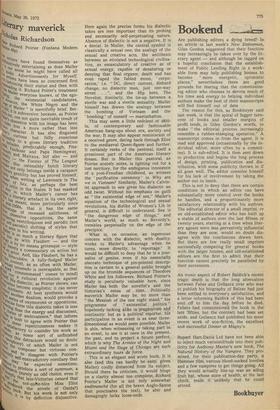BookendL._.....;;.4=3
Are publishing editors a dying breed? In an article in last week's New Statesman, Giles Gordon suggested that their function may increasingly be taken over by the literary agent — and although he tagged on a hopeful conclusion that the establishment of Public Lending Right in a workable form may help publishing houses to become "more energetic, optimistic places," nevertheless there are good grounds for fearing that the commissioning editor who chooses to devote much of his time and energy to helping individual authors make the best of their manuscripts will find himself out of date
The reason for this, as Bookbuyer said last week, is that the spiral of bigger turnover of books and smaller margins of profit tends, in Gibes Gordon's words, to make "the editorial process increasingly resemble a rubber-stamping operation." A manuscript comes in from the agent. It is read and approved (occasionally by the individual editor, more often by a committee). It is sub-edited. It is then sent down to production and begins the long process of design, printing, publication and distribution, with some publicity thrown in if all goes well. The editor consoles himself for his lack of involvement by taking the author out to lunch.
This is not to deny that there are certain conditions in which an editor can have substantially more control over the books he handles, and a proportionately more satisfactory relationship with his authors. The editorial director of a small imprint, or an old-established editor who has built up a stable of authors over the last fifteen or twenty years, starting at a time when literary agents were less pervasively influential than they are now, would no doubt disagree with the conclusions drawn here. But there are few really small imprints successfully competing for general books with the larger houses; and old-established editors are the first to admit that their function cannot precisely be paralleled by their successors.
An ironic aspect of Robert Baldick's recent tragic death is that the long altercation between Faber and Gollancz over who was to publish his biography of Balzac had just been settled to everyone's satisfaction, and a letter informing Baldick of this had been sent off to him the day before he died. Fabers had commissioned the book in the late 'fifties, but the contract had been set aside, and Gollancz had published his most recent work of non-fiction, the excellent and successful Dinner at Magny's.
Rupert Hart-Davis Ltd have not been able to inject much verisimilitude into their publicity for Anthony Master's new book, The Natural History of the Vampire. They promised, for their publication-day party, a Hammer film, various blood-sucked lovelies and a few vampires to get things going. All they would actually line-up was an ailing fruit bat, whose state of health, at the last check, made it unlikely that he could attend.
Bookbuyer










































 Previous page
Previous page